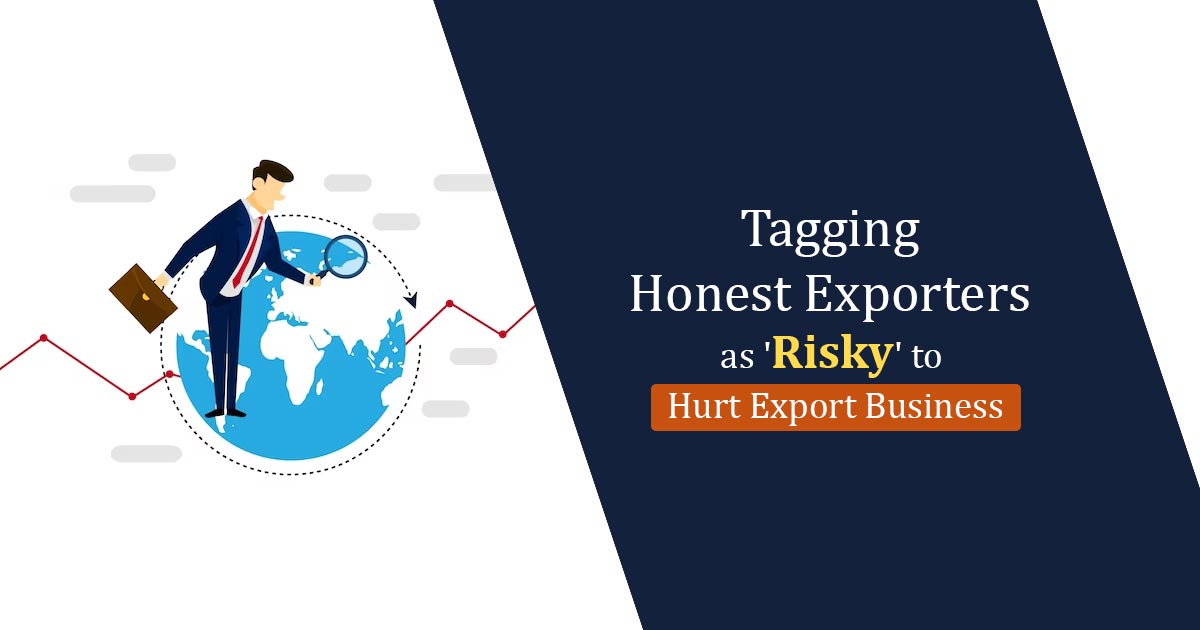
A report released on Thursday tagged a genuine exporter as ‘risky‘ and informed that it will affect India’s exports and the inter-ministerial board including representatives from commerce and finance ministries is needed to determine its detailed outlook before stigmatising them in such a category. Merely based on certain risk factors of customs, GST, income tax, and DGFT (Directorate General of Foreign Trade) data, exporters are identified as ‘risky’.
Details of the bracketed risky exporters are shared with the central GST formations as the process to verify physical and financial.
Global Trade Research Initiative (GTRI), a well-known economic think tank said that an announcement has been made by the Central Board of Indirect Taxes and Customs (CBITC) regarding procedure for tackling such matters but no timeline is followed.
The genuine exporters suffer significantly because of the time-consuming process of verification and requirements of excessive documentation before the matter is cleared, stated the report.
The report claimed that many legitimate firms engaged in export have been labelled as ‘risky’ exporters and stopped payment of their dues and making them follow ‘lengthy’ customs procedures.
This discourages genuine exports and disinclines them from exporting, said GTRI Co-Founder, Ajay Srivastava.
The CBITC implements the rule and conducts drives to nab firms that practice fake GST transactions. However, the recent drive resulted in hurting many genuine exporters, as per the report.
The issues at the ground level require attentive actions while dealing with them as the government is planning for USD 2 trillion in exports.
Several entities in exports are considered risky exporters by the CBITC even after they never had any direct business transactions with the supposed fraudsters, alleged the report.
Giving an example, it described the process of the CBITC and said that firm ‘A’ do business with firm ‘B’ and firm ‘B’ does business with another exporter company ‘C’.
In case, CBITC finds out any fake/illegal practices by the firm ‘A’, then the firm ‘C’ may be declared as a risky exporter by the board even after ‘C’ never engaged in business with ‘A’.
Srivastava said that the procedure followed by the board to label the genuine exporters as ‘risky’ has the potential to hurt many businesses in export.
If an exporter is branded as risky by the CBITC, all refunds for Integrated GST, Drawback, and RODTEP (Remission of Duties or Taxes on Export Products) and other benefits are stopped by the board.
Due to the branding, the firm goes through several damages including it may starve from most working capital, each consignment of that exporter has to go through an exhaustive examination at the CFS (Container Freight Station).
This leads the company to face financial loss and time delays. There is no certainty of on-time shipment after this. An exporter company dealing with 20 consignments monthly, may suffer significant financial loss. Without any firm reason, the exporter is treated as a criminal, he added.
The report also mentions that the number of firms that contribute to over 90% of India’s exports is below 10,000.
The government must think from the side of exporters as well before taking such extreme steps of branding the genuine exporter as risky. An inter-ministerial panel made of representatives from the Ministries of Finance, Commerce, and Industry is expected to be constituted which should have a detailed outlook before branding an exporter as risky. Prompt action should be taken on these cases, said the report.
Read Also: GST Impact on Export Industry in India
Even though the exporters are not at fault, they hesitate to complain. They fear that they have to face further consequences or ineffectual outcomes, it added.
There is no interaction made with the exporter whom the board bracketed as a risky exporter. Several times, after the firm’s consignment reaches the port or there is a delay in refunds, the firm’s CHA (Customs House Agents) informs the exporter about being tagged as a ‘risky’ exporter in such a situation, said the report.









